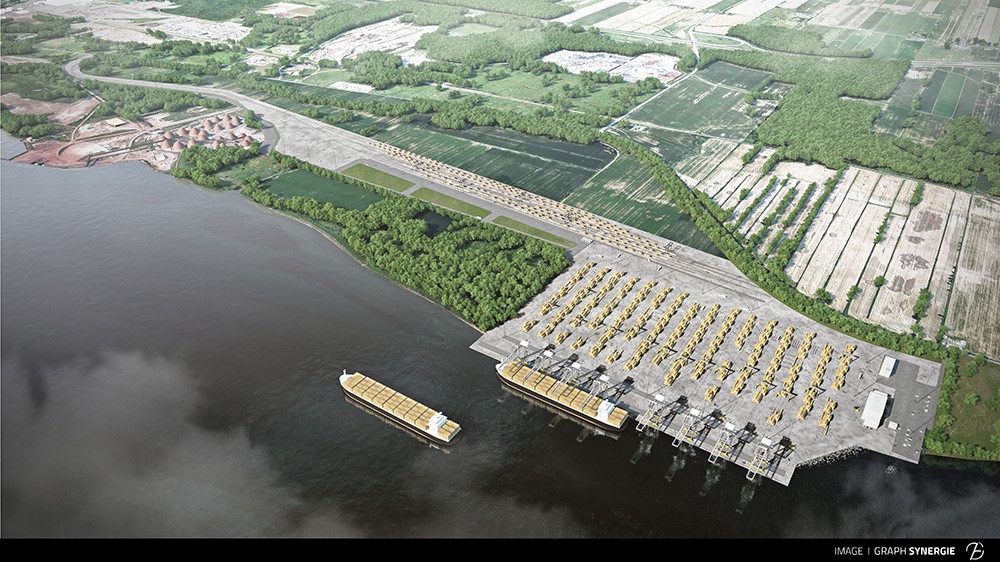
Dear partner members in the Cargo Montreal cluster,
As Vice-President, Contrecœur of the Montreal Port Authority (MPA), I am writing to share with you the progress of our project to build a container terminal in Contrecœur, which is the largest infrastructure project in the Port of Montreal’s modern history.
The Port of Montreal will soon reach its full handling capacity on the Island of Montreal. In 2018, we posted record results for a fifth consecutive year, with 1.7 million TEUs transiting our docks. This is excellent news for the Quebec and Canadian economies. For us, though, this growth means we need to develop new infrastructure to maintain optimal container handling capacity and ensure the future of freight transport in Montreal.
The Government of Canada supports us in this effort. Maintaining our port’s container handling capacity and efficiency is crucial to national prosperity. Therefore, on December 4, Canada Infrastructure Bank (CIB) confirmed its support by committing up to $300 million in financing for the Contrecœur terminal project. This CIB financing recognizes the transformative nature of the Contrecoeur terminal project. It enables the Port of Montreal to continue its efforts, in collaboration with the private sector, to complete the project’s financial package. It is noteworthy that this commitment follows the memorandum of understanding signed in August 2019, whereby the CIB provides the MPA with its expertise to plan the design, construction, financing, operation and maintenance of the terminal.
We are also benefiting from the expertise of leading partners to structure this major project: the engineering firm Arup is advising us on the technical aspects of the project, BMO on the financing package and Dentons on the legal dimension.
We know that once completed, this terminal will generate many business development opportunities for the transportation and logistics sector. Now is the time for the MPA to further engage in dialogue with companies in this sector so that they can prepare to seize these business opportunities. The MPA agreed with CargoM management to update you on a regular basis on various aspects of the project. For example, we plan to work with the Cluster to develop strategies to optimize travel between terminals on the Island of Montreal and Contrecœur.
The environment: the core of the terminal project
This initial communication is about our efforts to obtain environmental approval and permits. This authorization and these permits are prerequisites for construction of the terminal. Our Environment Department team has been working for several years with government agencies and stakeholders in the field so that the MPA can assess the project’s impact on the environment and design risk mitigation and habitat compensation measures.
To this end, we submitted our environmental impact assessment to the Canadian Environmental Assessment Agency (CEAA), now the Impact Assessment Agency of Canada (IAAC) (under both the former and current name, a division of the Department of the Environment and Climate Change Canada (ECCC)) in October 2017. We are in ongoing discussions with the IAAC and the various federal and provincial departments it consults.
More specifically, after submitting our impact study, we received a first set of questions from the CEAA/IAAC in May 2018. We are required to provide details on various aspects of the study, a normal process that will take a few more months.
The research and analysis to answer the first questions took almost a year of work for the MPA and its colleagues. A second wave of questions and comments from the IAAC and other government departments was sent to us in September 2019. The IAAC may send us a third set of questions in 2020. Once our information meets the expectations of the IAAC and the departments consulted, it will produce a preliminary report within thirty days and the public will then have thirty days to review and comment on it. The Minister of ECCC may then grant the project authorization. This will be followed by the issuance of permits from the Department of Fisheries and Oceans (DFO) and ECCC.
Proactive in the field
In the meantime, we are conducting several initiatives in the field to consult stakeholders, including Aboriginal nations, and to provide environmental offsets:
Furthermore, the MPA is working with economic development stakeholders to develop the Contrecœur-Varennes industrial port zone. We will also promote the project during consultations on the province’s new maritime vision.
Together, let’s stay the course!
In closing, I would like to point out that last January, the MPA announced its decision to work on a priority basis with its terminal operators, Montreal Gateway Terminals Partnership (MGTP) and Termont Terminal, to accelerate the execution of its business strategy to complete its Contrecœur Port Terminal Expansion Project. For several decades, MGTP and Termont have contributed to the growth of container traffic through the Port of Montreal. It is largely thanks to all our partners and their commitment that we now have the opportunity to develop the Contrecœur site.
So, I can only conclude this message by telling you that we are proud to count the transportation and logistics industry among the Port of Montreal’s partners. Through CargoM, the MPA has benefited from a number of networking and joint collaboration opportunities with other organizations in the Cluster. We would like to continue to do so, in particular by keeping you up to date on how our terminal project is going. You are also invited to email any questions or comments you may have to VPContrecoeur@port-montreal.com.
Best regards,
Ryan Dermody
Vice-President, Contrecœur